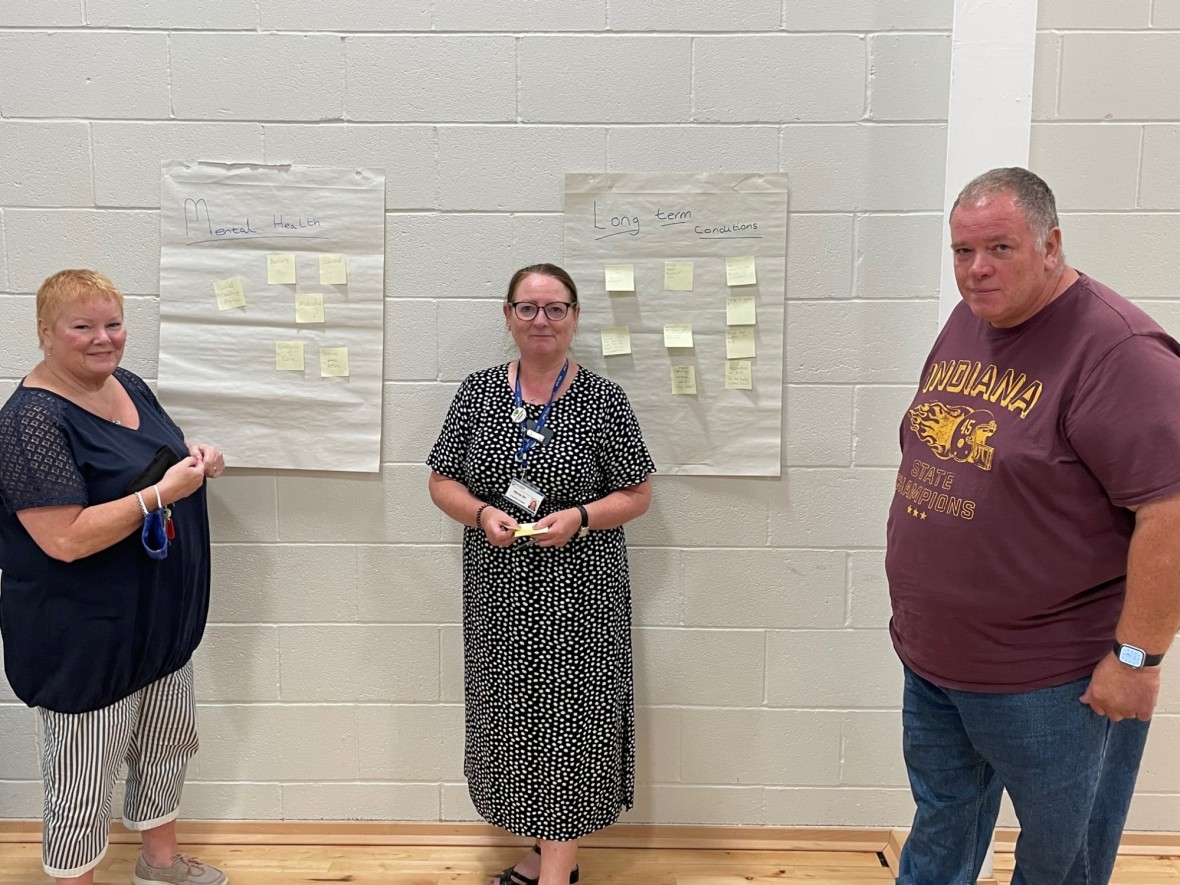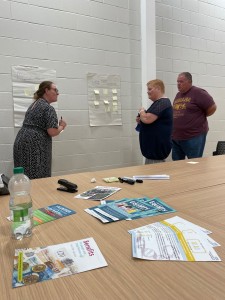GP practices in Selby are changing patients' lives with a new approach to their health
GP practices in Selby have been helping to change patients' lives with a new approach to managing the health of town residents.
One patient who has shed two stones in weight since being invited to take part in the new programme in May says being contacted by primary care staff may have saved his life.
Martin Bissell, a patient with Posterngate Surgery, said: "If I hadn't had that letter I'd be dead in two years. It was going that way. I'd spend most of my days sitting around with my feet up. I had no energy. It really inspired me to know there was something I could go and do."

From left, focus group participant Margaret Purden, Wellbeing Link Worker Wendy Gill and Martin Bissell at the latest meeting at Selby Leisure Centre
Selby Town Primary Care Network (PCN), which is made up of four GP practices serving an urban population of more than 50,000 patients, has been taking part in a 20-week Population Health Management project through national programme provider Optum UK.
It meant local NHS staff working with partners across the Selby district such as Humber, Coast and Vale Health and Care Partnership, Selby District Council, North Yorkshire County Council's Public Health and Stronger Communities teams and Community Services and York and Scarborough Teaching Hospitals NHS Foundation Trust – as well as the third sector through the Two Ridings Community Foundation – to develop support for patients aged 50-64 with moderate hypertension and frailty, based on their needs.
The diversity of partners involved meant the focus could be on finding wide-ranging solutions to support people's health and wellbeing, rather than purely medical interventions. The initial questionnaire for patients was put together with contributions from all partners, and Selby Town PCN Care Coordinators and Wellbeing Link Workers led on contacting patients and going through the questionnaire with them over the phone.
The conversations highlighted the need for more support and activities to help reduce loneliness and isolation. Patients were enthusiastic about being approached directly by their local primary care team, and some are now working together with Care Coordinators and Wellbeing Link Workers in a series of focus groups to help improve the services on offer in the Selby community.

Barlby resident Martin is one of those taking part in the ongoing process. He took redundancy from his role as an operations manager in the engineering industry during the COVID-19 pandemic, and planned to use his early retirement to get on top of his health. However, it was being contacted by the PCN team to take part in the Population Health Management project that provided the "nudge" he needed to get moving.
He said: "My job was very stressful with long hours, and I didn't have a lot of time to look after myself. After I took redundancy my son was telling me I needed to do something, and I took that letter as inspiration to say 'I'm going down this route, I'm going to talk to these people and see what they can offer and how they can help me'.
"I had the first telephone call with one of the team and it was really, really good. I think we must have been on the telephone for two hours. It was a really good conversation – she went through all of my issues. It really inspired me to know there was something I could get involved with. Since having that telephone conversation I've been coming to the meetings and trying to improve my health."
Former super-fit Army man Martin, who hopes losing weight will mean he can have an operation on a tear in his knee, also has sleep apnoea – but he is already reaping the benefits of his new approach, exercising in the swimming pool at Selby Leisure Centre most days in tandem with dietary changes – including fish for breakfast – to ensure the pounds are dropping off.
"I'm in the lucky position where I can afford to do it and I've got time to do it. I've taken control and I'm enjoying life – I've got two great sons, my wife, two great daughters in law, a granddaughter and hopefully more grandchildren to come."
The partners involved in the Population Health Management project are benefiting from a new understanding of each others' roles in supporting local people, which means they will be able to work together in future to anticipate need in the community and design interventions to meet it.
Positive impact
Selby Town PCN Frailty Care Coordinator Alice Houlden said: "Working with patients during the focus groups has been great. It has been wonderful to be able to provide our patients with an opportunity to raise any issues they may have in a supportive manner. We are really looking forward to working closely with the population of Selby to create services which will benefit them in the future. It has been a joy to be involved in this project."
Montana Baldwin, also a Frailty Care Coordinator in Selby, said: "As a team we've put a lot of time and effort into the project and at some stages we were unsure how successful the focus groups were going to be due to logistics. It was a challenge trying to coordinate the availability of patients, the focus group facilitators and the location, but the feedback and the involvement from the patients that have attended has been brilliant.
"This project is all about improving population health and the improvements that we've seen already have made all the work very worthwhile. We look forward to the project continuing to have a positive impact on patients."
Dr Nick Jackson, Clinical Director of Selby Town PCN and a GP partner at Beech Tree Surgery in Selby, said the project has been a "journey of discovery".
"It's taught us to think about our population in a completely different way in terms of anticipating need – not necessarily from the people who come to see us, although that's still important, but the people who don't come to see us, and how can we address their need before they develop a problem that needs our help.
"Nobody said 'I want more tablets' or 'I want to see my doctor more'. What's much more important is social connections, activities, a sense of belonging rather than more prescriptions. It forces general practice to think not just about reacting to illness but promoting health and wellbeing.
"Care Coordinators are such a valuable resource to us. They're not clinical – they can't and won't give out tablets – they're doing something much more important than that."
< Back to all news stories


